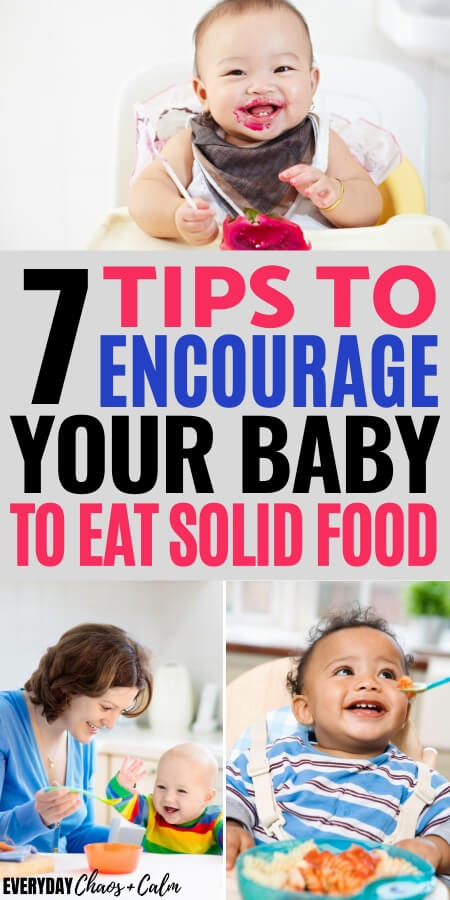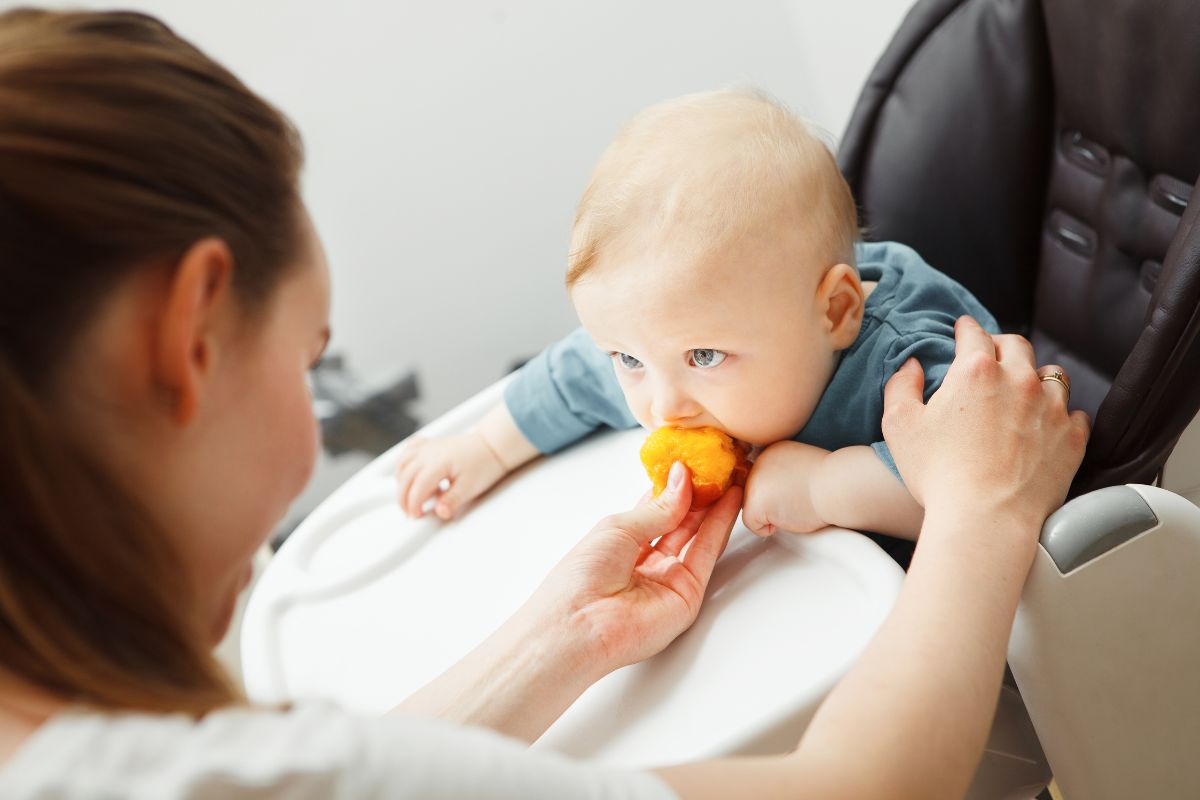Are you having trouble getting your baby to eat solid foods? Here are 7 tips to move passed milk (and mashed banana!) to eating solid foods with the whole family!
I remember when my first born was a baby. I bought baby cereal. And little jars of food. I introduced each one, one at a time. It wasn’t until a couple months later that I started to relax and remember it’s just food.
** This website contains affiliate links. If you make a purchase using one of these links, I may earn a commission. Please click here for more information about cookies collected and our privacy policy **.
Adding in solid foods to your baby’s diet is a fun adventure that lots of parents look forward to- and stress over.
But many babies take to eating solids with no trouble at all, but some don’t want anything to do with solids or table food. And you may struggle to get them to take in anything except breast milk or formula even past the year mark.
If that sounds like your baby, and you are worried your baby isn’t getting the nutrition he needs, or you are ready to start weaning off milk, here are some suggestions to try to get your baby to eat solid foods.

7 Tips for Encouraging Your Baby to Eat Solid Food and Table Food
Remember that all babies are different and will develop at different ages. Just because some babies are eating solids at 4 months and your 12 month old doesn’t want anything to do with them, doesn’t mean there’s anything wrong. But if you are stressed, or getting pressure from family or doctors to introduce more solids, here are some tips to encourage your baby to eat more solids.
(For reference, most babies can start eating solids at about 4-6 months of age)
Give them a taste
The best way to get babies to eat solids, is to give it to them when they ask. It doesn’t have to be a big production of high chairs, tiny spoons, bibs, and jars.
That means when your baby grabs for your fork as you eat your dinner, let them try it. It means sharing your breakfast, lunch, dinner, and snack.
(*within reason. Of course don’t be handing over that biscuit slathered in honey if we are talking about a baby under 1 year old or shellfish/wheat/eggs to a baby with a long family history of allergies)
Because here’s the thing. Babies can have spices. They can have most fruits. They can have most vegetables and grains.
Just give them a small taste of whatever it is you are eating, in a size that won’t cause a choking hazard.
My baby #1 got jars of pureed baby food. By the time I got to baby #3, he was eating “table food” right from the start. Just tiny pieces of whatever we were having when he started asking.
Make it a family dinner
When my babies were, well, babies, I worked hard to get them on our eating schedule as soon as possible. That meant, if we were sitting down for a meal, baby would be at the table.
Either on my lap tasting my dinner if he wanted, or in his high chair with his own portion to taste. Even before they started eating solids, the baby would be at the table with the whole family.
Don’t segregate your baby to his own meal times away from everyone else. Don’t let dad hold the baby, while mom eats and then she holds the baby while dad eats.
Let your baby see that eating is a normal everyday occurrence in the home.
He will be much more likely to eat solids when he sees that everyone else is eating too.

Variety of Tastes and Textures
Kids, no PEOPLE, are picky. We all have different tastes and let me ask you, would YOU like to eat a bowl of mashed green beans?
Offer different flavors and textures to allow your baby the chance to form his own taste in food.
Adding in textures will also help them learn how to chew.
There are plenty of foods that are easy to mash with a fork- banana or avocado, for example. Or my kids loved using mesh self feeders. I filled them with frozen fruits and they chewed on them, mashing the fruit out through the mesh (great for teething too!) We used mesh bag feeders, but it looks like these days everything is silicone- like this pulp feeder.
Don’t force it
Now I am the most stubborn person out there, but some things aren’t worth the fight- and food is one of them.
If your baby just won’t try solids, it’s okay. Remember that their breast milk or formula is the main source of nutrition during the first 12 months- everything else is extra.
Give them opportunity and tastes, but ultimately let the baby take the lead on what and how he eats solids.
You stressing will only cause more stress for everyone involved.
Let Them Feed Themselves
Some babies show their stubborn streak early. And they want to be independent and NOT be told how to eat. If your baby is showing his budding independence, let him feed himself.
Suction cup plates and bowls can be a life saver, or just place some food directly on the tray of the highchair.
Sure, most of the food may end up on your baby’s face, clothes, hair, and your floor, BUT the bigger deal here is that he’s learning to self feed and eat solids without pressure.
Just don’t forget the camera to catch that food-smeared face!
Let Them Practice
You might be seeing a pattern here. It’s all about opportunities and freedom to try.
I know that for some parents letting go can be hard. Especially when it comes to things that are messy or wasteful. But all of the above tips are about making food a natural part of life and meal time an everyday thing.
Give your baby ample time to practice eating. Small finger foods- such as cereal, tiny pieces of fruit, or soft peas- have 2 functions. One they are food. Two they offer practice for developing the pincer grasp and hand eye coordination.
Even if they get the food to their mouths and then spit it back out, they are still learning and developing. And the more they practice and the more they taste, the more likely they will start actually eating solids more.
So let them practice. In a high chair at meal times or just for fun. Either way, it helps.
Start Early**
When I say early, I DON’T mean putting cereal in a 2 month old’s bottle or even any age specifically. There are a lot of timelines out there that tell parents to start solids at a certain age, and to me that’s somewhat irrelevant.
What I mean by early, is don’t banish food from your baby’s life and then suddenly introduce it and expect them to eat.
For example, if you feed a toddler the same favorite meal every single day and then suddenly offer something new and unknown, it’s not likely to go over well, right?
It’s the same for babies, if they don’t know that solids even exist until they are 10 months old, they will likely balk at anything that’s not their breast milk or bottle.
So if you follow the advice above, and make sure they have plenty of exposure- watching you and the whole family eat, being given tastes of foods, and given plenty of opportunities to eat and practice, it will just be second nature to them.
Start early is my advice for many aspects of parenting from potty training to moving out of the crib. I know we want our babies to stay babies, but that doesn’t mean we can’t help them grow too!

Give Foods First (1 yr +)
So let’s say you do all this….
You give tastes and they spit it out. They refuse to feed themselves. They turn their nose up at anything and everything you give them. And they only seem to want to drink their bottle or breast milk.
You have tried not to worry, but they have passed their first birthday and still won’t eat many solids.
It’s possible that they are filling up on milk first and they aren’t hungry for other foods.
Remember before a year old, milk should be the main food source. When my babies were under a year, I’d always nurse them before solids. Around the year mark, we started to change things. When they woke up from a morning nap- around 11- instead of nursing them, we’d eat lunch.
I’d give solids first. Sometimes they’d eat well and I wouldn’t have to nurse for awhile, and sometimes solids weren’t their thing and they’d end up nursing right after lunch. But the longer we followed this schedule the more they started taking in solids.
What if Nothing Works?
As I said, babies are all different and they all develop at different stages.
Some babies have a stronger tongue thrust reflex.
Some babies do have underlying allergies.
Some babies are very stubborn.
But I still think early exposure to food, both in taste and just being aware of food in their environment, along with plenty of no-pressure opportunities- will go a long way in encouraging any baby to eat solids.


